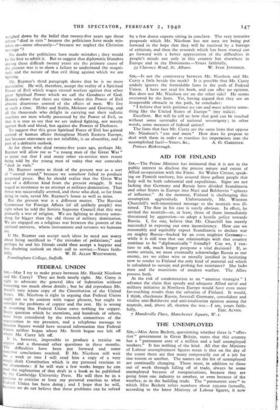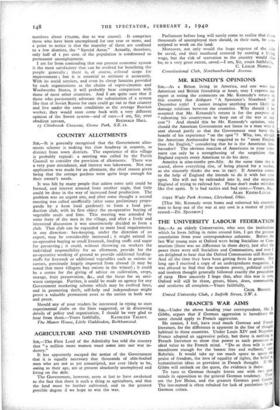THE UNEMPLOYED
Snt,—Miss Anne Beckett, questioning whether there is " effec- tive " government in Great Britain, states that this country has a "permanent core of a million and a half unemployed workers." It has nothing of the kind. All that the Ministry of Labour unemployment figures mean is that on the day of the count there are that many temporarily out of a job for one reason or another. The names on the list of unemployed are continually changing. There must, in addition to those out of work through falling off of trade, always be some unemployed because of reorganisations, because they are going from one industry to another, or even because of the weather, as in the building trade. The "permanent core" to which Miss Beckett refers numbers about 250,000 (actually, according to the latest Ministry of Labour figures, it now numbers about 170,000, due to war causes). It comprises those who have been unemployed for one year or more, and a point to notice is that the majority of them are confined to a few districts, the "Special Areas." Actually, therefore, only half of i per cent. of the population is condemned to permanent unemployment.
I am far from contending that our present economic system is the most satisfactory that can be evolved for benefiting the people generally ; there is, of course, colossal scope for improvement ; but it is essential to estimate it accurately. With its social services, and even its cheap luxuries provided by such organisations as the chains of super-cinemas and Woolworths Stores, it will probably bear comparison with those of most other countries. And I am quite sure that if those who passionately advocate the substitution of a system like that of Soviet Russia for ours could go out to that country and live under the same conditions as the average Russian worker, they would soon come back with a very different opinion of the Soviet system—and of ours.—I am, Sir, your







































 Previous page
Previous page